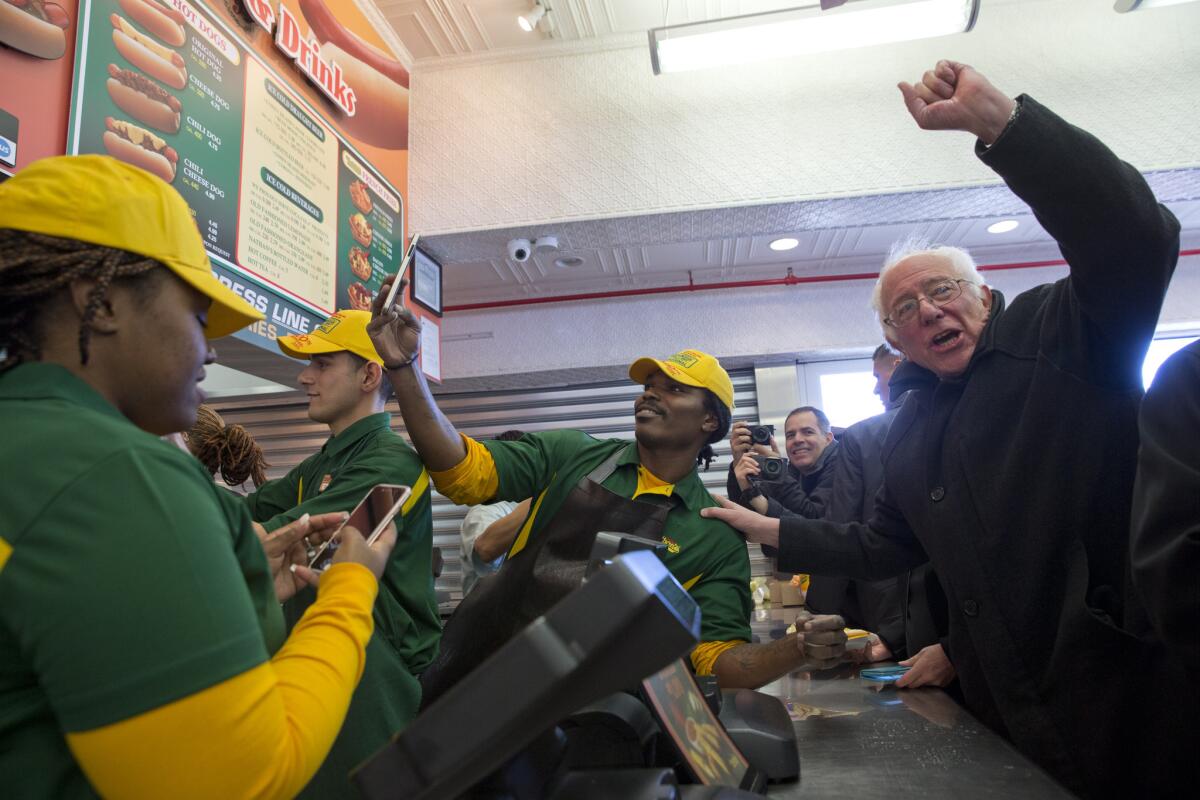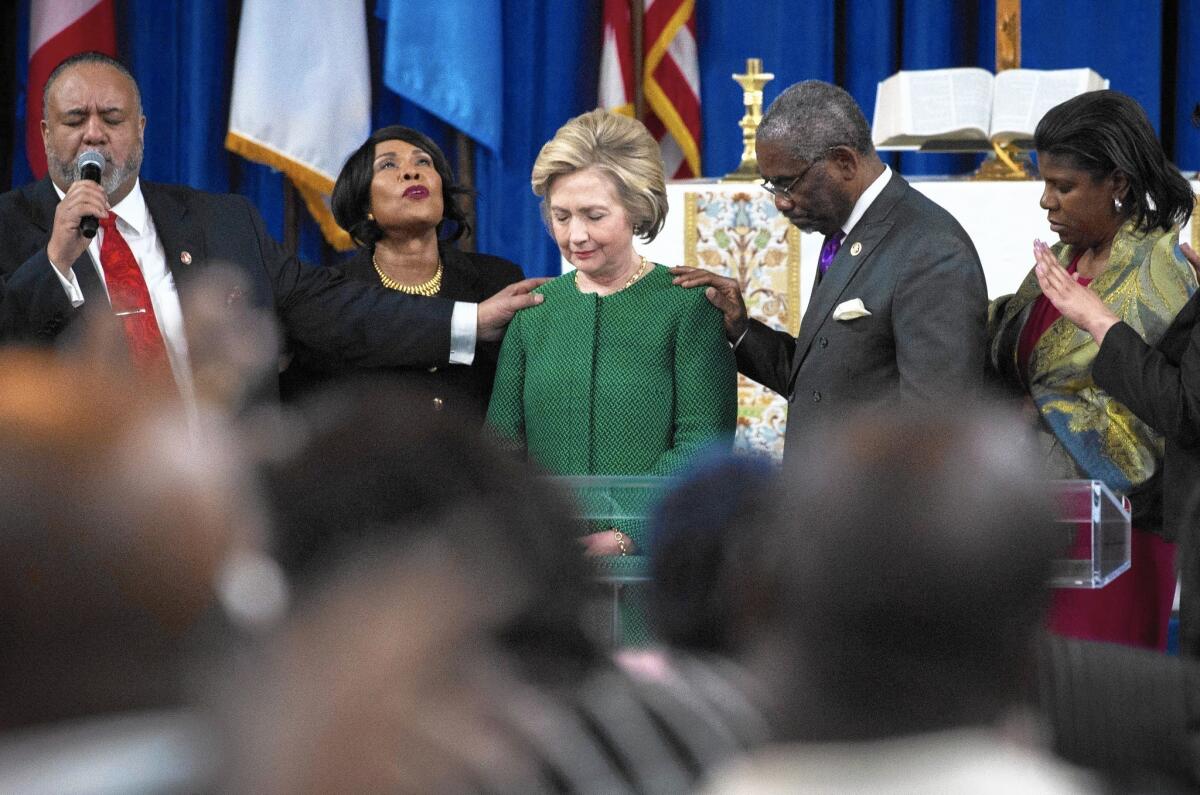After exchanging harsh words last week, Clinton and Sanders get back on message

Bernie Sanders orders a hot dog at Nathan’s Famous in Coney Island in New York.
- Share via
Reporting from NEW YORK — For the Democratic presidential candidates, Sunday served as a metaphor for the 2016 race in its entirety and the raucous April 19 New York primary contest in particular.
Hillary Clinton traversed the middle-class Jamaica area of Queens to visit three African American churches. She is leaning heavily on that traditional pillar of power in the Democratic Party as she seeks another victory in the state where she won two U.S. Senate races and the 2008 presidential primary.
Over and over, she touted her support for President Obama and her marriage to and partnership with another president, Bill Clinton, suggesting she is an extension of two administrations hugely popular among Democrats.
Bernie Sanders hoofed it out to the chilly boardwalk on Coney Island, not far from where he grew up in Brooklyn. He greeted thousands of supporters in another of the mass rallies that have served as a visible, passionate counterpoint to Clinton’s more carefully crafted appearances.
If not exactly running against Presidents Obama and Clinton, he at least reproached them for failing to behave as boldly as he pledges he would if he is elected to the White House.
It provided a fresh reminder that the senator from Vermont is running against the political establishment in both parties.
On Sunday, each candidate’s pitch was typified by lines they have delivered over and over this primary season.
“I don’t think President Obama gets the credit he deserves. Saving the economy, passing the Affordable Care Act insuring 20 million Americans and for doing so much else that has been good,” Clinton said.
She spent almost as much time talking about Obama as she did about herself, part of a calculation that Democrats who support the president will reward his first secretary of State.
Sanders blistered an economy that forces people to work “not one job, but two jobs or three jobs.” He did not have to mention that the nation has been led for 15 of the last 23 years by a Democratic president named Clinton or Obama.

“In America we can do better than that,” he said. “We are going to create an economy that works for all of us, not just the 1%.”
The race in New York has been testy at times; Sanders and Clinton went at each other last week over their basic qualifications for the job in a back-and-forth with some bite.
But if that appeared to have eased somewhat by the weekend, the campaigning also showed how little the main thrusts of the campaign have changed since they squared off in their first contest, the Feb. 1 caucuses in Iowa.
Clinton’s and Sanders’ political personas are almost completely sketched in by now: Clinton as the brand politician playing the cards of experience and prudence in a campaign rocked by the unpredictability of Sanders and Republican Donald Trump; Sanders as the would-be revolutionary confronting the fact that the party’s nomination largely rewards virtues like loyalty and the longtime relationships at which Clinton excels.
Their New York campaign commercials speak to the differences in approach.
Sanders practically roars from the television screen as he lays into Wall Street, the hometown industry that he argues has contributed to a rigged economy and corrupt campaign financing — and, he suggests, has bought and paid for Clinton.
“Will they like me? No! Will they begin to play by the rules when I’m president? You better believe it,” he declared in one ad.
Clinton’s ad features pictures of the White House and speaks of her preparation — as first lady, U.S. senator and secretary of State.
Its subtext goes to the notion, which she would forward in a general election as well, that she’s the only candidate with the breadth of experience necessary to be president in difficult times.
The absence of any harsh anti-Sanders attacks by Clinton spoke to her desire to unify the party if she wins the nomination. She remains the favorite, far ahead in delegates for the Philadelphia convention, and polls show she holds a big lead in New York.
Clinton’s alliance with Obama could prove particularly potent in New York, one of a few states in which the president actually did better in his 2012 reelection than in his first victory in 2008.
Obama has carefully avoided picking sides in the nomination race. But in an interview Sunday on Fox News, he twice praised Clinton’s record as secretary of State as “outstanding.”
Clinton’s tie to Obama and continuing affection for Bill Clinton are particularly important to black voters like those who filled the churches in Queens on Sunday.
At one stop, in a two-for-one anecdote, she recounted how Obama repeatedly asked her to take the job as secretary of State. She said she refused twice and later expressed frustration to her husband about Obama’s persistence.
“‘I asked you to marry me twice,’” she recalled Bill Clinton saying. “He said to me, ‘Do you see a pattern here?’ I see two very charismatic men hard to say no to.”
At New Greater Bethel Ministries, Clinton delivered the day’s only criticism of Sanders — one that was exaggerated — and it involved Obama.
“Make no mistake what this election is about,” she said. “On the one hand we have someone who rejects the idea that President Obama has made progress. Doesn’t give him the credit that I think he deserves. On the other hand, we have Republicans who want to turn the clocks back and go in the wrong direction. So our job in this election is to stand firm and make it clear we’re going to build on the progress President Obama has made for America.”
Sanders has not, in fact, rejected the idea that Obama has made progress during his seven years in office. But he has cast Obama’s achievements as insufficient, particularly when it comes to cutting down the power of Wall Street financiers and providing healthcare to all Americans.
For his part, Sanders’ effort Sunday did not seem aimed at a particular demographic but at persuading his entire raucous tribe of believers to show up one week from Tuesday to provide an upset that could grievously harm Clinton’s candidacy.
For much of the campaign, Sanders has been the big-event candidate, his appearances drawing tens of thousands of people to rallies across the country to feverishly applaud his calls for political revolution and, even more, his arcane explications of congressional maneuvers.
That enthusiasm has driven Sanders to victories in low-turnout caucuses and helped him win Michigan in what remains the biggest upset of the Democratic campaign so far.
But in other major states with far more delegates, including Ohio and Illinois, big Sanders rallies did not translate into primary wins.
On Sunday, he sought to energize a largely youthful crowd with his standard calls for free college tuition, a Medicare-for-all healthcare plan, immigration reform and a host of other ideas favored by liberal Democrats.
“There is going to be a very, very important Democratic primary here in New York state,” he said, prompting one of his supporters to scream, “And you’re gonna win!”
“In this primary we are taking on all of the establishment.... I hope very much that here in New York state you’re gonna help lead this country toward the political revolution which we need.”
Twitter: @cathleendecker
See more of our top stories on Facebook >>
MORE ON POLITICS
Obama says Hillary Clinton was careless with emails but didn’t jeopardize national security
Cruz outmaneuvering Trump in behind-the-scenes battles for delegates
‘We need an outsider like Trump,’ says this two-time Obama voter
More to Read
Get the L.A. Times Politics newsletter
Deeply reported insights into legislation, politics and policy from Sacramento, Washington and beyond. In your inbox three times per week.
You may occasionally receive promotional content from the Los Angeles Times.











